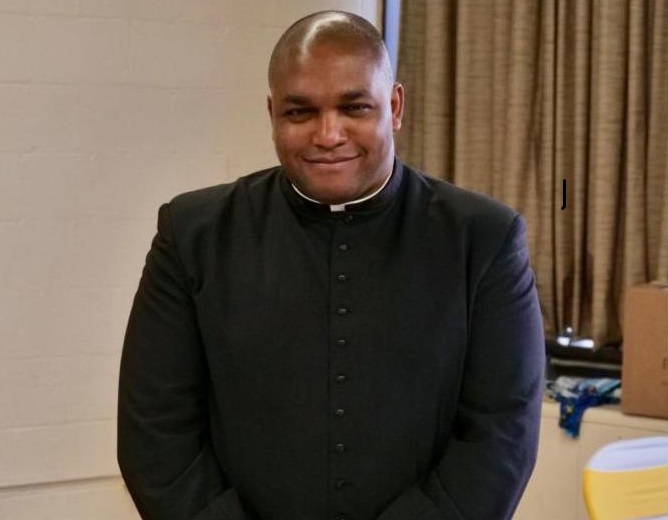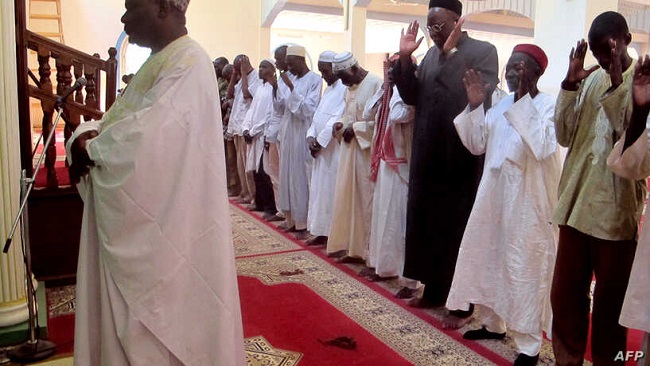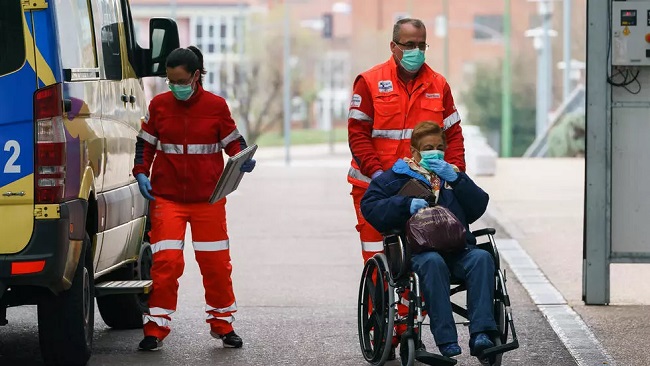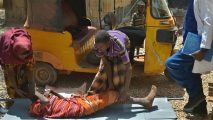26, April 2020
The Dialectics Between Jerusalem & Emmaus: The Courage to Move on With Life 0
Theme: The Dialectics Between Jerusalem & Emmaus: The Courage to Move on With Life. Ste Anne’s Parish, Salem MA: Catechesis, Third Sunday of Easter
“We Had Hoped that He will be the One to Liberate Israel” (Luke 24:21)
Dear Holy People of God,
Jesus Christ is Risen, Alleluia! I would like to reflect with you this Sunday on the two cities, Emmaus and Jerusalem, in terms of their significance for us today. And what is this significance? The Courage to Move on with Life!
- Today’s Gospel text offers the opportunity to walk with the Lord to Emmaus. St Luke gives us very interesting details about the journey of these two disciples on the way to Emmaus. I find it interesting that though located just seven miles from Jerusalem, Biblical scholars are still unable till date to locate the present-day site of Emmaus. That itself is spiritually very symbolic, for it means that Emmaus is the unknown destination that captures the uncertainties of human existence. Emmaus is the route of existential and pragmatic blindness. It symbolizes the human search for meaning, for the purpose of life: “We had hoped that he (Jesus) will be the one that will liberate Israel,” the two disciples say to the Risen Christ who remains unrecognizable to them. Emmaus is the point in which with my back against the wall, I set out in search of possible new solutions.
- “We had hoped….” These words offer us the hidden word of Emmaus: A journey of dashed hopes. How often do we feel our hopes dashed? The disciples had just been in Jerusalem, the place of certainty. They had accompanied their Master to the City of David, that is, Jerusalem, the political and religious capital of Israel, expecting there their Master’s ultimate triumph over the forces of oppression over Israel, specifically, Roman power. And yet, like a horrible dream, Good Friday happened. “Are you the only stranger in Jerusalem?” (Luke 24:18), – the disciples ask the unidentifiable Risen Jesus. The disciples were still in a state of shock that Jesus, the one who had power to raise Lazarus from death, the one who had performed so many miracles, could not help himself. He had died a shameful death on the Cross of Calvary. Thus, Jerusalem, the place of hope and ultimate triumph over servitude, oppression and exploitation, had suddenly become a place of despair and hopelessness.
- Hence, the two locations are very spiritually significant: Jerusalem, the place they were leaving behind, and Emmaus, the place they were heading to. How often do we feel the need to leave things behind, to put certain happenings behind us? We can no longer withstand them. Thinking about them takes the energy away from us. We do not want to remain with that thing that happened or that event. We do not want to keep going back there, because the thought of it elicits memories we would rather not have. That is Jerusalem, the place we no longer want to be. Yes, it is true that there had been some good things, some good times, some beautiful times, but how it all turned out is not what I had expected. Hence, I’d rather move on. To remain at that point, to remain in Jerusalem, is killing me in the inside! I can’t take it anymore. I am suffocating. I just got to move, to leave this place, to leave this person. I might not know where I am going to; I might not know where I will pass this night; I might not know how I will pay the mortgage; I might not know whom I will meet on the other side; I might not even be sure if I will get to the other side, but being here, in Jerusalem, is no longer an option for me. Jerusalem is death. It has only horrible memories to offer me. It is the place of betrayal. I trusted in this friend, he betrayed me. I gave her my love, she betrayed me. I took him into my inner circle as a confidant, shared the secrets of my life with him, and he turned around and used those secrets against me! I loved her. Married her. Placed all together. Hoped for a life together. All of a sudden, I got a divorce notice! I lost everything I had ever worked for! I did all I could for these kids or this kid, sacrificed my life’s savings to see them through college. And yet, no sense of appreciation. Thoughts of all I have sacrificed is killing me in the inside. If I continue to be in this place, my head will explode. I got to go, even if I do not know where I am going to. I must leave Jerusalem, even if I am unsure of the next bus stop. I can’t stand the pain, which is killing me many times over, before my real death.
- I do not know if I am speaking to you, but my own experiences of life have presented me with a thousand moments of Jerusalem! I have had friends that have stood by me, friends whose company I continue to cherish. I have had moments that I wanted no end to; events that I never felt should cease to be. And I can go on. Life has been good. But to tell you the truth, and I owe you the truth, more so as your spiritual leader, life has not all been rosy. There have been friends whom I trusted and confided in that have betrayed me. There have been companions that I felt we were on the same page, people I placed so much faith in, gave all of myself to, stood by them, made consequential sacrifices for them, risked all I could for them, only to discover that what I had hoped for, – like the hope of Cleopas and his friend in today’s Gospel text, – was not to be. How could he do that to me? How could she do that to me? How could they do that to me? It is hard when love is betrayed.
- But with time, I have learnt what the Danish Christian existentialist philosopher Søren Kierkegaard captured in his celebrated maxim, that is, that life must be lived forward but understood backward. I can either choose to remain in the pain and despair of Jerusalem, or seek for a new lease for my life in Emmaus, even if unsure of where Emmaus is. It has been better, in the final analysis, to move on. It is not easy, because one gets trapped in the known. There is security in the known. But the disciples on the way to Emmaus show us that as hard as it might be, there is value in letting sleeping dogs lie, there is a value in burying the hatchet, there is value in moving on. How so? Because Emmaus is the place of encounter with the Risen Lord and with the Risen Lord comes new energy, a new vigor, not to escape the challenges of life, but to face them head on, learning from them, and bringing out the new from the old.
- Emmaus teaches us that the Risen Lord enters the story when the story has hit rock bottom. Emmaus teaches us that movement, the readiness to leave behind, is the prerequisite for new energy, for a new lease on life. We cannot simultaneously be in Jerusalem and at Emmaus. There has to a “seven-mile” movement, for faith comes from movement: Abraham leaving the land of Ur to Canaan; Moses, leaving Pharaoh’s Palace to the Desert; Simon, Andrew, James and John, leaving Wall Street for the itinerant preacher who had no way to lay his head; Matthew abandoning the IRS for the same preacher, and so on. There is always a movement in order to be ready for prime time, in order to be ready for the next level that God has in store for you. The question is, do you have the courage to make the move? Greek philosophy had a sense of the value of movement in order to get to the next level: Katabatic movement, that is, movement from the One (that is, God), and Anabatic movement, that is, movement to the One (that is, God) – (Plotinus, Enneads).
- Emmaus teaches us that you cannot combine despair and hope, and that running away from despair, leaving frustration behind, is the doorway to hope, to the burning of heart – a symbol of reinvigoration. It is only after we have had the courage to leave behind the pain, the feeling of frustration, of agony, and of embarking on the unknown journey, that is, of making the leap to faith, the darkness of faith, the unknown of faith, of the “suspension of the ethical” – as Kierkegaard writes in Fear and Trembling, that the Risen Lord comes to give us back all that we had thought was lost, that is, the gift of the Risen Lord himself, the hope, energy and vitality and all that the Risen Lord brings into our lives, the light at the end of the tunnel, the silver lining behind the dark cloud, for the present and the future, Amen!
(Fr Maurice Agbaw-Ebai)



























26, April 2020
Understanding the Ngarbuh Commission Report: Dedicated to Ambassador Herman J. Cohen 0
That Ngarbuh Commission Report: Vindication of Impunity
My initial reaction to the Cameroun Government report on the atrocity crimes committed against armless civilians in Ngarbuh in Donga Mantum was focused on the Commission recommendations on criminal responsibility for the crimes. I concluded that, to the extent of the Commission recommendations, the report is a whitewash intended to insulate superior civilian and military commanders who planned and authorized the attacks and crimes from individual and superior command responsibility.
The applicable threshold for establishing criminal responsibility is that of “persons bearing the greatest criminal responsibility” and not subordinates physical perpetrators. The report in this case, established that subordinate perpetrators submitted a report to their superiors which was skewed to mask their responsibility for the crimes. Does this justify the exclusion of every commander in the chain of command from criminal responsibility? The answer is no.
Apart from the outcry from the surviving victims and human rights and humanitarian assistance personnel operating in the area which should have warranted the superior commanders including the Senior Divisional Officer and the Governor to initiate investigations, the entire governmental and military higher command structures praised the professionalism of the army and its affiliate militias who committed the crimes. They did not conduct an investigation of the crimes prior to praising them and harrassing witnesses, first responders, national and international human rights and humanitarian organisations personnel who raised the alarm.
The report did not address this conduct and the rationale for the cover up of the crimes. The Commission did not address the false claim that the civilian settlement was an operational base for armed combatants. Even if was, that did not change the civilian character of the civilian settlement. The high command of a professional army should responsibility for failing to establish rules of engagement that protect civilians in armed conflicts. It should define the army in clear terms that do not include civilians. The report did not address this critical matter in the law and customs of war. From the Commission report, the High Command of the Cameroun Army appeared to endorse the justification for the crimes provided by physical perpetrators whose account it has discredited in other significant respects
The voices of the victims in the report are muted or ignored whereas the investigation ought to be about them in order to meet the minimum threshold of credibility.
The report rather than address the crimes, responsibility for the crimes and mechanism for accountability, makes recommendations which if accepted and implemented will celebrate impunity and international criminality.
The report recommends the establishment of a military camp in the affected civilian settlement. This recommendation may knowingly or unintended provide a troubling rationale for the attacks and the crimes. It may be reasonably inferred as a rationale for the attack and that the crimes were ordered to vacate the victims from their ancestral lands to make room for a military encampment. Furthermore, it is a violation of the Geneva Conventions to establish a military camp in a civilian settlement. Worse, it may amount to a crime of deportation to vacate civilians from their ancestral lands and their subsistence economy to establish a military camp. This may amount to interference with a crime base, supporting reasonable suspicion that the report may be a whitewash. The recommendation that the victims be exhumed and given a decent burial may appear reasonable at face value but begs the question. What was the nature and extent of the forensic pathological and ballistic investigation conducted to ascertain the cause of death of each victim and who was responsible for the deaths. This investigation would have provided an answer to the weapons used that caused the death of some or all of the victims. This would have established or rule out the allegation of death by cross fire floated by some Government officials.
Additionally, it would have established the causes of death by gunshots and/or by fire which the report established was set by Cameroun Government soldiers. It appears from this report that no expert or scientific investigation was conducted. There also appears to be no technical intelligence investigation to ascertain the communication chain and content between the subordinate forces deployed to conduct the attack and superior commanders. The identity of the victims both dead and alive appears not to have been the focus of the Commission, so also the identity of the alleged 5 combatants who were allegedly killed in the alleged operation. The alleged members of the militia who participated in the attack are not identified by organization or as individuals. It is not enough to state that they were ten in number. What is important is who they are. What is their relationship with the Government and military operational command?
Finally, I am unpersuaded that rather than recommend physiological treatment for surviving victims for the trauma of the attacks and loss of loved ones, the report recommends celebrating impunity through building a military camp for the military that has admitted responsibility for the attack and the crimes. In similar circumstances, in other situations, monuments are built to honour the memories of the innocent victims and not the impunity of the military establishment responsible for the atrocity crimes.
For these reasons, I strongly urge the international justice and human rights organisations to establish an independent investigation into the Ngarbuh massacres and all other crimes committed in the prosecution of the war in which the Ngarbuh massacre is a component. Failing to do so will give tacit blessings to impunity and a fig leaf of contempt for human life.
By Chief Charles A. Taku